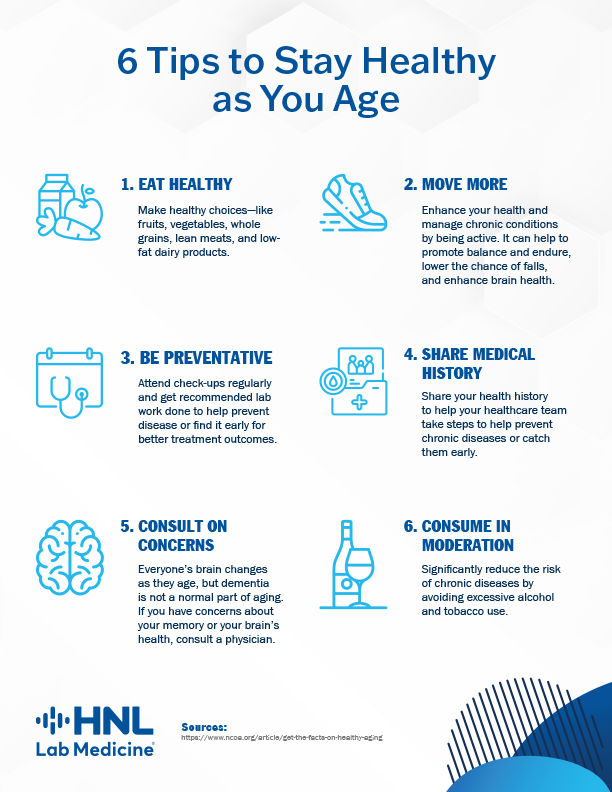Lab Tests for Healthy Aging
 Curious about staying youthful? The secret is a healthy lifestyle. It is never too late to get started! You can make healthier lifestyle choices at any age. One of the easiest ways to stay healthy is to visit your doctor regularly and keep up with regular health screenings.
Curious about staying youthful? The secret is a healthy lifestyle. It is never too late to get started! You can make healthier lifestyle choices at any age. One of the easiest ways to stay healthy is to visit your doctor regularly and keep up with regular health screenings.
The National Institute on Aging recommends regular doctor visits and health screenings to support healthy aging. Regular screenings can uncover diseases and conditions you may not yet be aware of, such as diabetes, cancer, and cardiovascular disease¹.
Your healthcare provider will likely order different lab tests to monitor your health or to diagnose a condition. Let’s learn about some of the available tests that might provide insight into your health.
Common Lab Tests
Thyroid Hormone PanelA Thyroid Hormone Panel can monitor the thyroid for conditions such as hyperthyroidism and hypothyroidism, which affect metabolism and mood. This panel measures the amount of thyroid-stimulating hormone (TSH) in your blood. TSH causes the thyroid to produce hormones. Too much TSH indicates conditions like hypothyroidism because the thyroid is not as responsive to its signal. Too little TSH may be indicative of hyperthyroidism. A thyroid hormone panel may also measure FT4, or free thyroxine, which helps your doctor diagnose conditions like Hashimoto’s disease or Graves’ disease.
Lipid Panel
A Lipid Panel provides information about the health of your heart. It measures cholesterol and triglycerides. These are types of lipids, or fats, in the blood that come from food. High levels of cholesterol and triglycerides can indicate the risk of heart disease, narrowed arteries, heart attack, or stroke. Triglyceride levels can also help your doctor detect conditions like metabolic syndrome, pancreatitis, and diabetes.
 Diabetes Profile
Diabetes Profile
A Diabetes Profile offers a comprehensive look at blood sugar, or blood glucose, levels. This simple blood test measures your average blood glucose level over a two-to-three-month span. The amount of glucose in your bloodstream is controlled by a hormone called insulin. When the body cannot produce or effectively use insulin, this leads to high blood glucose levels. This may indicate diabetes or prediabetes. Your doctor might order this test to diagnose diabetes or to help manage this condition.
Comprehensive Metabolic Panel
A Comprehensive Metabolic Panel monitors your metabolism. This means it measures how the body uses food to create energy, and how well the body processes waste. This panel of 14 different tests measures kidney and liver health, fluids, electrolytes, and blood sugar. Your doctor might order this panel to diagnose a medical condition. A comprehensive metabolic panel is also used to check the body’s response to medication and monitor for side effects.
Complete Blood Count
A Complete Blood Count counts and evaluates the cells in your blood. This can show evidence of infection, anemia, or leukemia. This test is often ordered to review your overall health. A complete blood count can also be used by your doctor to monitor health conditions or medication, or to help diagnose a medical condition.
Diagnostic Tests
Along with panels and monitoring tests, your doctor might run tests for more specific conditions, like arthritis, hepatitis C, and anemia. These tests can help your doctor make a diagnosis and check the efficacy of your treatment.
ArthritisArthritis causes pain in the joints and can affect quality of life. There are different types and causes of arthritis. Each type of arthritis has its own form of treatment. Most forms of arthritis present with joint pain, joint stiffness, and reduced range of motion. An arthritis profile helps diagnose a form of arthritis called rheumatoid arthritis, which is an autoimmune disorder that causes chronic inflammation, joint pain, and joint swelling. Rheumatoid arthritis often affects multiple joints and can even affect organs like the lungs, heart, and eyes. Some tests can measure the among of inflammation in the body and, along with symptoms, may be able to help diagnose certain types of health conditions.
 Hepatitis
Hepatitis
Hepatitis is inflammation of the liver. The hepatitis C virus (HVC) can cause a chronic form of hepatitis that may lead to liver cirrhosis or cancer. It is possible to have this infection and not know until many years later. The hepatitis C test evaluates exposure to this specific type of hepatitis virus. While there are many causes of hepatitis, adults born between 1945 and 1965 have the highest incidence of hepatitis C infection.
Red blood cells
When the body is unable to produce enough healthy red blood cells, it cannot get enough oxygen to meet its needs. This is called anemia. Anemia can lead to tiredness, weakness, dizziness, and an elevated heartbeat. There are many different types of anemia and lab tests such as vitamin B12, ferritin, and hemoglobin can help diagnose anemia or other deficiencies. Physicians may order other tests to check for the causes of anemia or to monitor treatment of this condition.
Using these common tests, your doctor will be able to diagnose, monitor, or assess your risks for certain medical conditions. The first step of treating any health condition is identifying it. Lab tests provide valuable information to identify, diagnose, and treat disease. It is important to get routine check-ups and diagnostic tests to stay healthy.
Preventative Care

Although lab tests are an important piece of healthy aging, they are not the only piece. Healthy lifestyle choices include preventative care measures, too. Physical activity and a healthy diet support your physical health to keep you active for longer.
Caring for your mental health by managing stress and participating in social activities can improve your quality of life. Reducing bad habits, like smoking and drinking alcohol, is another way you can start making better choices. All of these factors support healthy aging.
Now you know some of the commonly ordered blood tests to support healthy aging. Visit your doctor today! And don’t forget- HNL Lab Medicine’s Patient Service Centers (PSCs) are a comfortable and accessible option to get your bloodwork completed quickly and regularly.
The best time to make healthy lifestyle choices is now. According to the Office of Disease Prevention and Health Promotion, Healthy living is healthy aging². No matter where you are on your journey, good lifestyle choices will improve your health and set you up for a future of healthy aging.
REFERENCES
¹ National Institutes on Aging. (2022, February 23). What do we know about healthy aging? National Institutes of Health. https://www.nia.nih.gov/health/what-do-we-know-about-healthy-aging.
² Reed, P. (2021, September 3). Health and well-being matter: Healthy living is healthy aging. Office of Disease Prevention and Health Promotion. https://health.gov/news/202109/health-and-well-being-matter-healthy-living-healthy-aging.